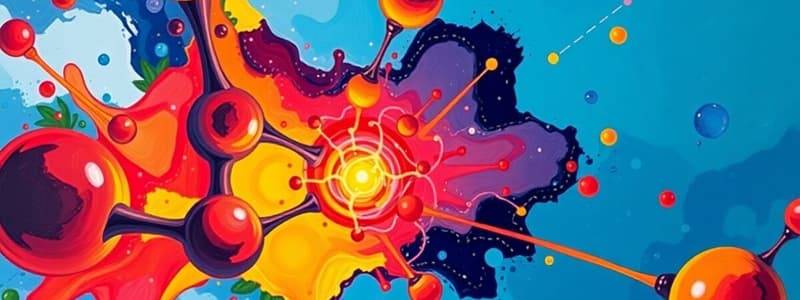Podcast
Questions and Answers
What is the effect of branching on the strength of intermolecular forces (IMF)?
What is the effect of branching on the strength of intermolecular forces (IMF)?
- Decreases IMF strength (correct)
- Has no effect on IMF strength
- Increases solubility in water
- Increases IMF strength
Which factor has the primary effect on increasing IMF strength when comparing different functional groups?
Which factor has the primary effect on increasing IMF strength when comparing different functional groups?
- Presence of nonpolar bonds
- Molecular weight
- Type of functional group (correct)
- Greater number of carbons
Among the compounds listed, which would likely have the highest boiling point due to stronger intermolecular forces?
Among the compounds listed, which would likely have the highest boiling point due to stronger intermolecular forces?
- Butane
- 2-methylpropane
- Butan-1-ol (correct)
- Propan-1-ol
Which of the following statements about the boiling point and IMF strength is true?
Which of the following statements about the boiling point and IMF strength is true?
When comparing similar functional groups, what is the first tiebreaker in determining boiling points?
When comparing similar functional groups, what is the first tiebreaker in determining boiling points?
Which branched hydrocarbon would likely have the lowest boiling point?
Which branched hydrocarbon would likely have the lowest boiling point?
Which of the following factors does NOT affect the strength of intermolecular forces?
Which of the following factors does NOT affect the strength of intermolecular forces?
Why does alcohol evaporate faster than water?
Why does alcohol evaporate faster than water?
What is the effect of increasing the number of carbons in a molecule on its polarity?
What is the effect of increasing the number of carbons in a molecule on its polarity?
Which type of intermolecular force is the strongest?
Which type of intermolecular force is the strongest?
How does branching in a molecule affect its intermolecular forces?
How does branching in a molecule affect its intermolecular forces?
What role do electronegative atoms play in determining the polarity of a molecule?
What role do electronegative atoms play in determining the polarity of a molecule?
What type of intermolecular force is primarily responsible for the attractions in water?
What type of intermolecular force is primarily responsible for the attractions in water?
Which of the following best describes dipole-dipole interactions?
Which of the following best describes dipole-dipole interactions?
What happens to intermolecular forces as the contact area or surface area between molecules increases?
What happens to intermolecular forces as the contact area or surface area between molecules increases?
Why do oil and water not mix?
Why do oil and water not mix?
Flashcards are hidden until you start studying
Study Notes
Intermolecular Forces
- Intermolecular forces (IMF) refer to forces of attraction between molecules.
- Types of IMFs include:
- London Dispersion Forces (Van der Waals)
- Dipole-dipole interactions
- Hydrogen bonds
- Ion-dipole interactions
- Ion-ion interactions
Alcohol vs. Water
- Alcohol evaporates faster than water due to weaker intermolecular forces.
- Water has stronger hydrogen bonding compared to alcohol's hydrogen interactions, leading to lower evaporation rates.
Mixing of Oil and Water
- Oil does not mix with water due to differences in polarity.
- Water is polar, while oil is nonpolar, leading to immiscibility.
London Dispersion Forces
- Present in all molecules, particularly significant in nonpolar molecules.
- Strength increases with larger atomic or molecular size.
Dipole-Dipole Interactions
- Occur between polar molecules due to permanent dipoles.
- Interaction strength depends on the dipole moment's magnitude.
Hydrogen Bonds
- A stronger type of dipole-dipole interaction where hydrogen is bonded to electronegative atoms like O, N, or F.
- Significantly stronger than regular dipole interactions.
Factors Affecting Intermolecular Forces
- Polarity:
- More electronegative atoms result in stronger polar characteristics (e.g., OH, NH).
- Increasing carbon atoms generally leads to decreased polarity.
- Surface Area:
- Greater contact area allows for increased intermolecular forces.
- Linear molecules stack well and enhance IMFs, while branched molecules reduce stacking efficiency, decreasing IMFs.
Comparing Functional Groups
- Stronger intermolecular forces result in higher boiling points, melting points, and densities.
- Between similar functional groups:
- More carbon atoms correlate with increased London dispersion forces.
- Branched structures exhibit diminished IMFs.
Practical Applications
- Comparing boiling points can be determined based on IMF strength.
- Example compounds to compare:
- Butane
- Butan-2-ol
- 2-methylpropane
- Propan-1-ol
- Butan-1-ol
Summary of Relationships
- Boiling/melting point and density are indicative of IMF strength.
- Stronger IMFs lead to higher physical property values.
- First tiebreaker for similar groups is number of carbons; second tiebreaker is molecular branching.
Studying That Suits You
Use AI to generate personalized quizzes and flashcards to suit your learning preferences.



